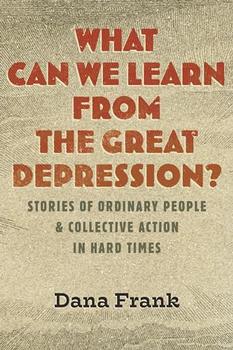
Stories of Ordinary People & Collective Action in Hard Times
by Dana Frank
Four stories of resilience, mutual aid, and radical rebellion that will transform how we understand the great depression.
Drawing on little-known stories of working people, What Can We Learn from the Great Depression? amplifies voices that have been long omitted from standard histories of the Depression era.
In four tales, Professor Dana Frank explores how ordinary working people in the US turned to collective action to meet the crisis of the Great Depression and what we can learn from them today. Readers are introduced to
the 7 daring Black women who worked as wet nurses and staged a sit-down strike to demand better pay and an end to racial discrimination
the groups who used mutual aid, cooperatives, eviction protests, and demands for government relief to meet their basic needs
the million Mexican and Mexican American repatriados who were erased from mainstream historical memory, while (often fictitious) white "Dust Bowl migrants" became enshrined
the Black Legion, a white supremacist fascist organization that saw racism, antisemitism, anti-Catholicism, and fascism as the cure to the Depression
While capitalism crashed during the Great Depression, racism did not and was, in fact, wielded by some to blame and oppress their neighbors. Patriarchy persisted, too, undermining the power of social movements and justifying women's marginalization within them. For other ordinary people, collective action gave them the means to survive and fight against such hostilities.
What resulted were powerful new forms of horizontal reciprocity and solidarity that allowed people to provide each other with the bread, beans, and comradeship of daily life. The New Deal, when it arrived, provided vital resources to many, but others were cut off from its full benefits, especially if they were women or people of color.
What Can We Learn from the Great Depression? shows us how we might look to the past to think about how we can shape the future of our own failed economy. These lessons can also help us imagine and build movements to challenge such an economy—and to transform the state as a whole—in service to the common good without replicating racism and patriarchy.
"A well-crafted work of social history that highlights little-known aspects of pre–World War II America." —Kirkus Reviews
"Dana Frank is an inspired storyteller whose work serves inspired purpose. Here, she surfaces stories of folks who mostly have been invisibilized as agents of collective struggle against oppression, precarity, insecurity, and exclusion...Always situating the history of specific collective action in the larger system of racism and patriarchy in a capitalist state, Frank leaves us with much to cheer and much to fear. Enjoy this beautifully crafted book, then get to work democratizing the economy and society." —Gwendolyn Mink, coauthor of Fierce and Fearless: Patsy Takemoto Mink, First Woman of Color in Congress
"In our time of climate crisis and resurgent fascism, many Americans have turned to 'great men' to lead us back to a time of imaginary virtues and moral clarity. Dana Frank, instead, looks to the history of the Great Depression for guidance and cautionary tales. In this honest, often surprising book, Frank reframes the 1930s as a moment in which common individuals struggled to make sense of a world in collapse. She reminds us of the precarity and promise of democracy in a nation prone to racial logics and xenophobic outbursts. We need this reminder, now, more than ever." —Matt Garcia, author of Eli and the Octopus: The CEO Who Tried to Reform One of the World's Most Notorious Corporations
"The most important book on the Great Depression in a generation. The United States lurched between democratic renewal and outright fascism in the 1930s with no clear outcome in sight as European nations capitulated one by one to tyranny. Dana Frank skillfully shows how working-class people experimented with new forms of organizing based on traditions of struggles against racism as well as class and gender oppression. Even as many of their aspirations for equal justice remained unfulfilled—and forgotten—Frank shows that African American service workers, Mexican migrant laborers, and women organizers heroically transformed their mutual aid societies, unemployed movements, and industrial unions into a New Deal for the nation. Our understanding of the Great Depression and its contested legacies will never be the same thanks to this brilliant and timely book." —Paul Ortiz, author of An African American and Latinx History of the United States
This information about What Can We Learn from the Great Depression? was first featured
in "The BookBrowse Review" - BookBrowse's membership magazine, and in our weekly "Publishing This Week" newsletter. Publication information is for the USA, and (unless stated otherwise) represents the first print edition. The reviews are necessarily limited to those that were available to us ahead of publication. If you are the publisher or author and feel that they do not properly reflect the range of media opinion now available, send us a message with the mainstream reviews that you would like to see added.
Any "Author Information" displayed below reflects the author's biography at the time this particular book was published.
Dana Frank is Professor Emerita of History at the University of California, Santa Cruz. A well-regarded senior historian, she is the author of many books on labor, women, and social justice in the US and Honduras. Her writing has appeared in the New York Times, Washington Post, Guardian, The Nation, Foreign Affairs, and many other publications, and she has testified before both the US Congress and Canadian Parliament.




Silent gratitude isn't much use to anyone
Click Here to find out who said this, as well as discovering other famous literary quotes!
Your guide toexceptional books
BookBrowse seeks out and recommends the best in contemporary fiction and nonfiction—books that not only engage and entertain but also deepen our understanding of ourselves and the world around us.